‘If you can see it, you can be it.’ Idaho’s Huerta proudly wears her heritage at World Cup
- Oops!Something went wrong.Please try again later.
- Oops!Something went wrong.Please try again later.
Growing up, Sofia Huerta faced the impossible choice presented to all children of immigrants.
Spanish flowed as the native language in her Boise home, she traveled to Mexico multiple times a year, and her family made sure she knew of her roots. But outside the home, she had to navigate an English-speaking world and an American culture at school, during sports and with friends.
It leads many children to question where they belong. But Huerta always refused that binary choice. She proudly wears her Mexican heritage on her sleeve and, now, a World Cup jersey.
Huerta will become one of just three Mexican American women to ever represent the U.S. women’s soccer team at a World Cup when the Americans kick off their title defense Friday in New Zealand.
Two of those three are on this year’s roster, and it’s a distinction Huerta wears with honor.
“I’m really proud to represent the Latinx community,” Huerta said at the U.S. team’s media day last month. “I’ve been asked before if it felt like pressure, and I said absolutely not. It’s something that I’m really proud of.”
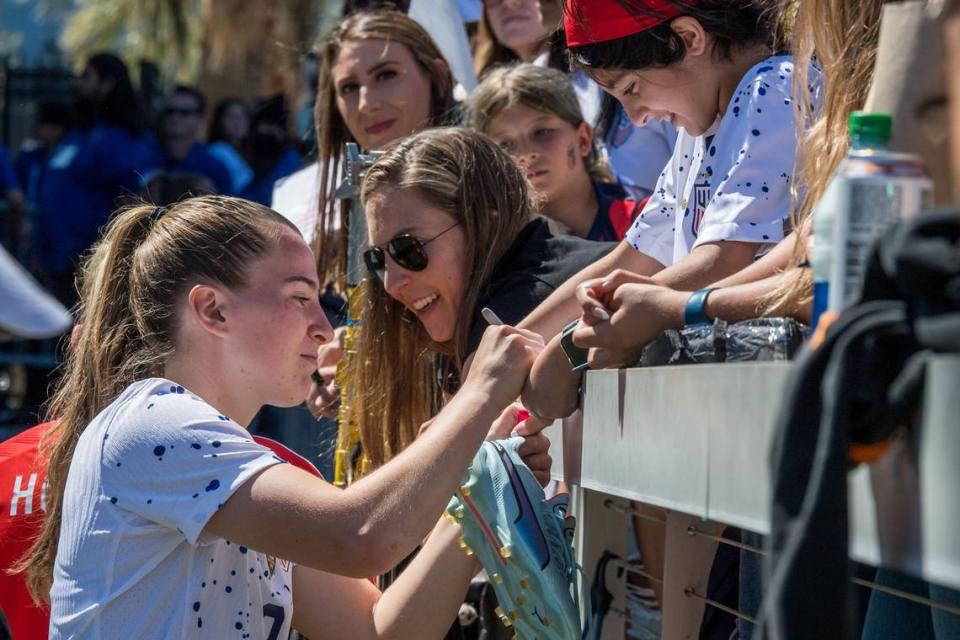
FROM MEXICO TO IDAHO
Huerta’s Mexican roots trace back through her father, Mauricio Huerta. The Puebla native met his future wife, Jody Jensen Huerta, while studying abroad at the University of Wisconsin. Handwritten letters and a rotary phone kept them connected until she studied abroad at his university in Monterrey. After graduating, the Wisconsin native moved to Mexico as an English teacher, and the two married in 1985.
They spent five years together in Mexico and had their first child, Andrea Huerta, in the country. But they itched to get back to the United States. So Mauricio, an engineer for HP, applied for a transfer, and the trio landed in Boise in 1988.
Sofia Huerta followed four years later as the youngest of three children. Mauricio expected her to become their little girl in frilly white dresses and a pretty bow in her hair. She quickly proved them wrong.
“She was competitive, and she doesn’t take, ‘No,’ easily,” Mauricio said with a laugh. “As a kid, she was a challenge. Let’s admit it. We got called to the principal’s office quite a few times.
“... She was dirty and playing and competitive. I wanted to protect that because I knew that would help her in life. You don’t want to just conform to the rules. You want to challenge the rules. From the beginning, she has (always) been that way.”
Mauricio worried about the identity crisis the children of immigrants often face. But he and Jody both stressed the importance of their children’s Mexican heritage. All three children first spoke Spanish. The family regularly traveled to visit Mauricio’s seven siblings and extended family. And Jody said they made an extra effort with Sofia as the youngest child, the one furthest removed from their days in Mexico.
“When we go there, we’re speaking Spanish with an accent,” Mauricio said. “When we come here, we obviously have an accent, and you look different. That’s something that we had to navigate constantly.
“But luckily for Sofia, she feels as American as apple pie. When she was growing up, there was no border. For her, Mexico and the U.S. were just a continuous geographic area, and she could go either way.”
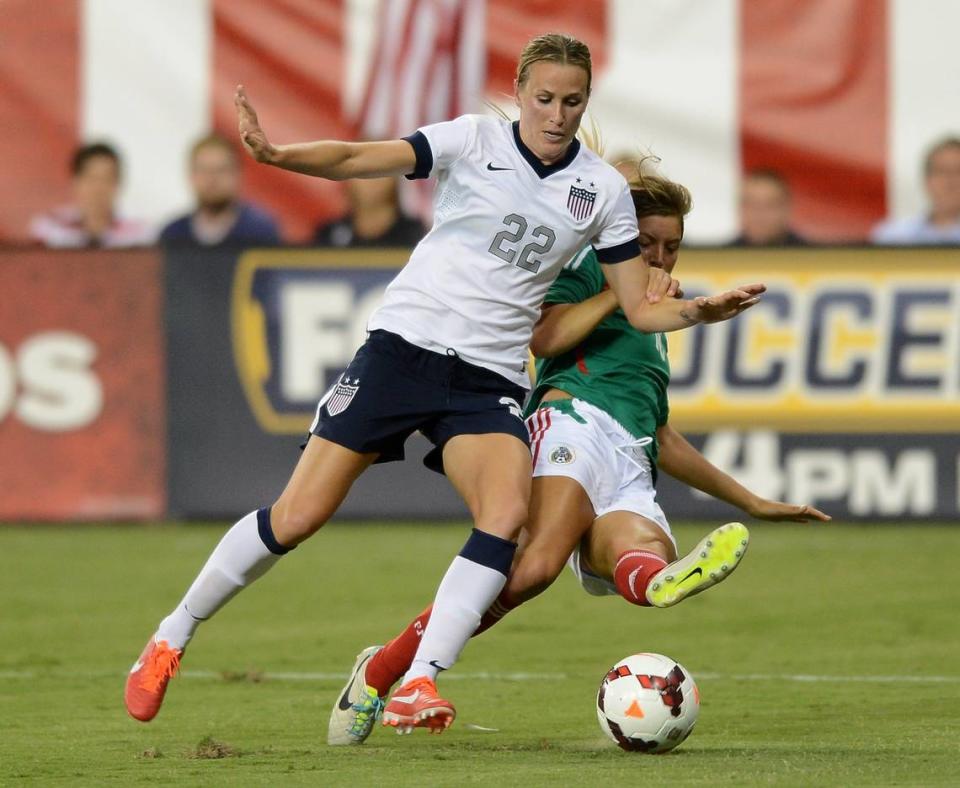
MEXICO OR THE U.S.?
That headstrong girl blossomed into a dominant, multisport athlete at Centennial High. She was twice named Idaho’s all-class, Gatorade girls soccer player of the year. She won four state track titles as a hurdler. And she led the Patriots’ girls basketball team to three district titles, making the all-state team twice.
But U.S. national team coaches never showed much interest in Huerta. They only invited her to one youth national team camp, and they deemed her unworthy of making the squad for the 2012 U-20 World Cup in Japan.
The snub left Huerta’s lifelong dream in jeopardy. But, as always, she refused to take no for an answer and found another way.
She turned to Mexico, where she held dual citizenship thanks to her father. Huerta promptly scored three of Mexico’s seven goals at the U-20 World Cup while playing with a broken elbow. Mexican coaches pulled her up to the senior national team, and she scored twice in five appearances.
She quickly proved herself as an international-level player. But some Mexican fans struggled to accept the American-born player, calling her a “gringa,” a derogatory term for an English-speaking, white woman.
“I have lighter hair, lighter skin,” Huerta told NBC Sports. “So I think people were just questioning how Mexican I was. Which is just so funny, because I’m like, ‘You guys, my blood is Mexican. My family’s from Mexico. Literally, I go there all the time.’
“So it was always pretty difficult for people to really understand who I was.”
Huerta took the field for Mexico’s senior team in a 2013 friendly against the U.S., later making her the first woman to ever play for and against the U.S. But even with her stock rising, she carefully avoided any competitions that would permanently set her international eligibility with Mexico. Playing for the U.S. always remained the dream, no matter how many times it told her no.
Then, at 22, she finally had to make a choice — Mexico or the U.S. She rolled the dice and picked the U.S., despite no indication American coaches were even interested.
It was the U.S., or bust.
“If I would have gone back to that time, probably 90% of people would have told me to play for Mexico,” Huerta said at media day. “I’ve always kind of been a little rebellious, but I really didn’t want to listen to all of them.
“I knew exactly what I wanted to do, and I believed in that.”
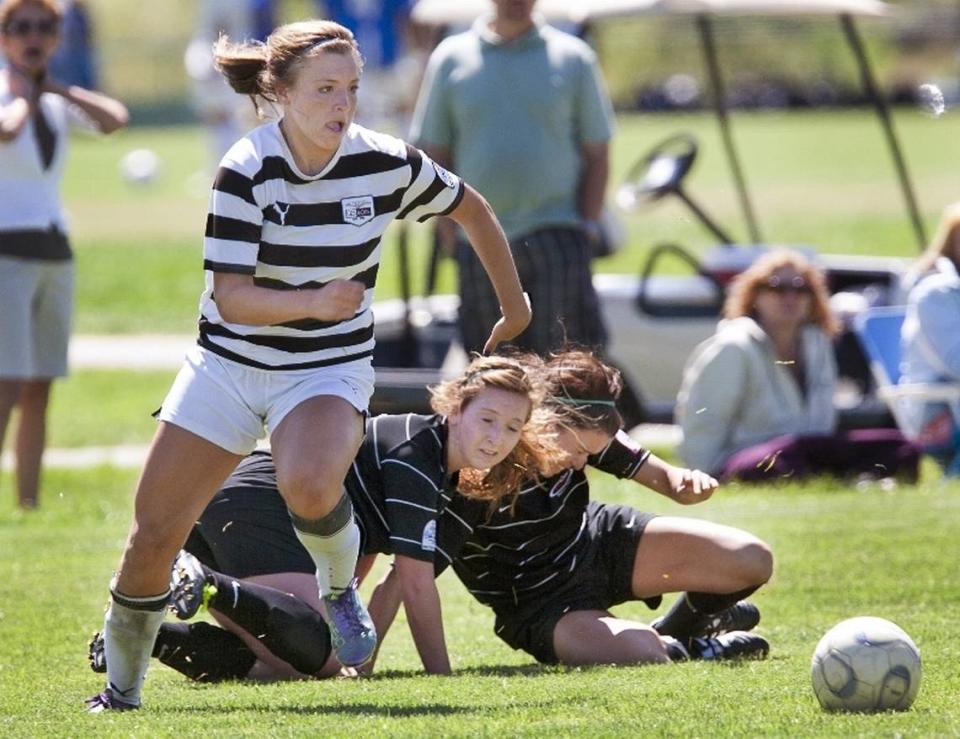
HUERTA’S LOW POINT
Mauricio said Mexican coaches pleaded with him to change her mind. They told him she’d never play for the U.S., and the blowback from fans was swift.
“I received some critiques from the fans that I was a traitor, I wasn’t really Mexican, and to go back to where I belong,” Huerta told NBC Sports. “There were things that were not the nicest to read.”
But growing up in Boise, the U.S. women’s team played an outsized role in her life. She watched as a mesmerized 7-year-old when the U.S. hoisted the World Cup in 1999. The next year, she wrote, “I want to play for the U.S. national team” when I grow up on a second-grade assignment.
Several productive seasons with the NWSL’s Chicago Red Stars finally piqued the interest of U.S. coaches, who invited her to train with the team in the summer of 2017. Huerta quickly impressed, and the U.S. filed a one-time request for her to change national teams.
FIFA approved the move, and Huerta made an immediate impact, assisting an Alex Morgan goal in her debut two days later. But the U.S. wanted Huerta to play outside back with the national team, and her club coaches in Chicago and Houston refused to waste one of the league’s top offensive talents at a position she’d never played before.
With no opportunities to develop, the U.S. stopped calling in 2018. The 2019 World Cup and 2021 Olympics came and went without Huerta sniffing the roster. She called it the low point of her career.
“I just didn’t know if I was ever going to get the opportunity again to play for the U.S.,” Huerta said at media day. “It’s so competitive. Getting one opportunity to play for the U.S. is such an accomplishment. But to get two?
“I just never knew if it was going to happen again.”
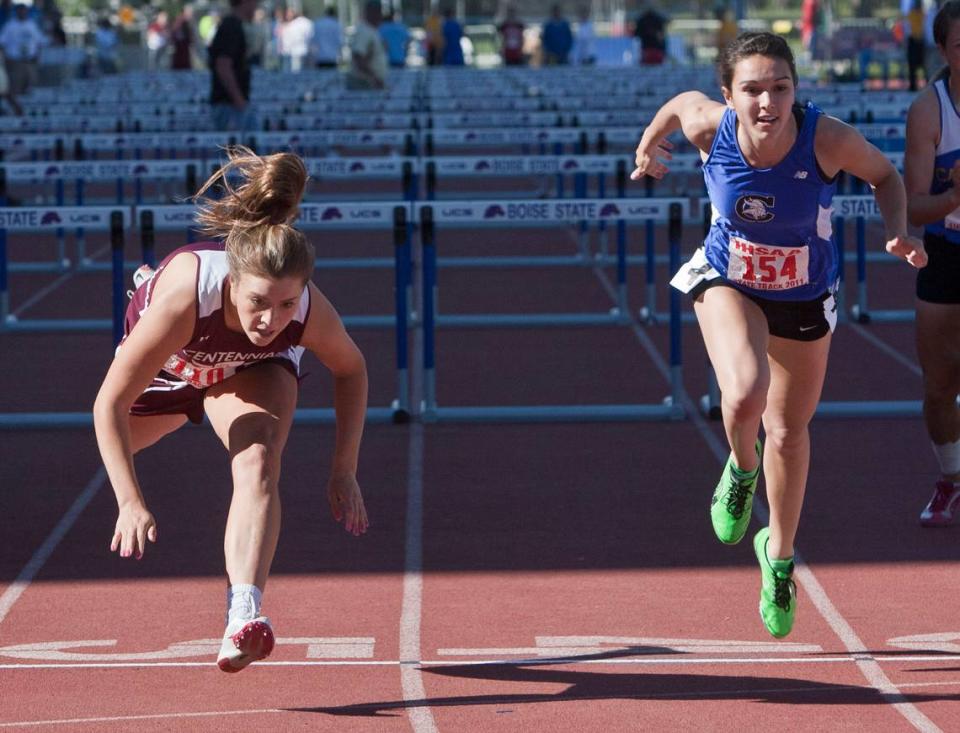
THE LONG ROAD BACK TO THE U.S. TEAM
Thankfully, it did. It took three-and-a-half years for the national team to come calling again. But Huerta made sure she was ready.
Still refusing to take no as an answer, Huerta spent her years in exile honing her skills at outside back. She spent three offseasons playing in Australia to get more minutes under her belt. She signed with Seattle’s OL Reign because they wanted her to play outside back. And she redefined success, abandoning her all-or-nothing attitude toward the national team.
“I was putting way too much pressure on myself to perform every time I stepped on the field,” Huerta said at media day. “(I thought), ‘I have to have the best game ever, so I can get called back in.’ I just wasn’t able to perform at my best because of that.”
The new Huerta rounded into form just at the right time though. The U.S. finished a disappointing third at the 2021 Olympics with an aging roster, and new U.S. coach Vlatko Andonovski vowed to find the next generation of American talent.
Huerta may not qualify as a young, up-and-coming player. She’s appearing in her first major international tournament at 30. But her form as one of the NWSL’s most dangerous right backs and most feared crossers made her impossible to ignore any longer.
“Her story is incredible,” Andonovski said at media day. “That was a brave move, what she did way back. To say, ‘No, I’m going to work hard to achieve this because this is my dream.’
“To work so hard for so long, and to be driven and committed and dedicated to achieve that (dream), it just speaks to her character. It is certainly a character we welcome on this team.”
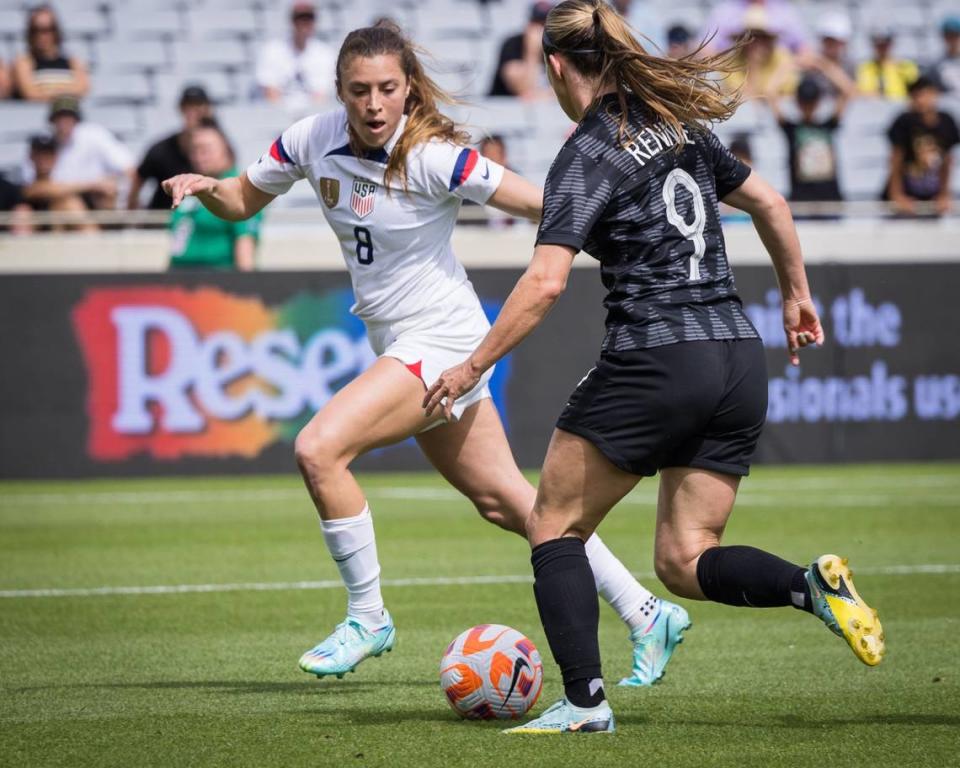
A ROLE MODEL
Huerta credits that character to all the nos she heard in her career.
They led her to Mexico, where she proved herself as an international player. They fueled her when everyone said she couldn’t make a U.S. team. And they forced her to keep digging when U.S. coaches stopped calling, creating the player on a superpower’s World Cup roster today.
Huerta’s journey came full circle last summer as she helped lead the U.S. to the Concacaf W Championship title in Monterrey, the city where Mauricio and Jody first made a life together. Huerta played in all five matches, including one against Mexico, with her extended family cheering her on from the stands.
Now on the World Cup stage, Huerta embraces her status as a role model for all those other first-generation children wondering where they belong.
“When I was making the decision to play for Mexico or the U.S., I struggled because I wanted to represent both. Obviously, that wasn’t possible,” Huerta said at media day.
“But I had a lot of conversations with my dad, and I felt like it was possible that if I played for the U.S. and I had Huerta on the back of my jersey, that little boys and girls could see the Hispanic last name.
“And if you can see it, you can be it.”
U.S. WORLD CUP OPENER
Who: U.S. vs. Vietnam
When: 7 p.m. Friday, July 21
TV: FOX
Watch party: At JUMP in downtown Boise, starting at 6 p.m. Beer and wine are available for purchase, and outside food is welcome. Centennial High, Huerta’s alma mater, will host a youth mini World Cup before the game and at halftime. It will also sell snacks, drinks and T-shirts.

